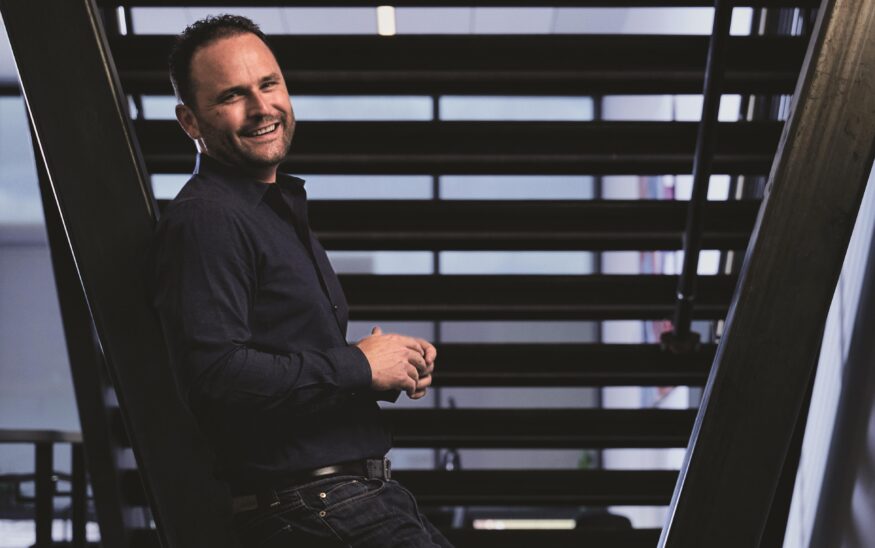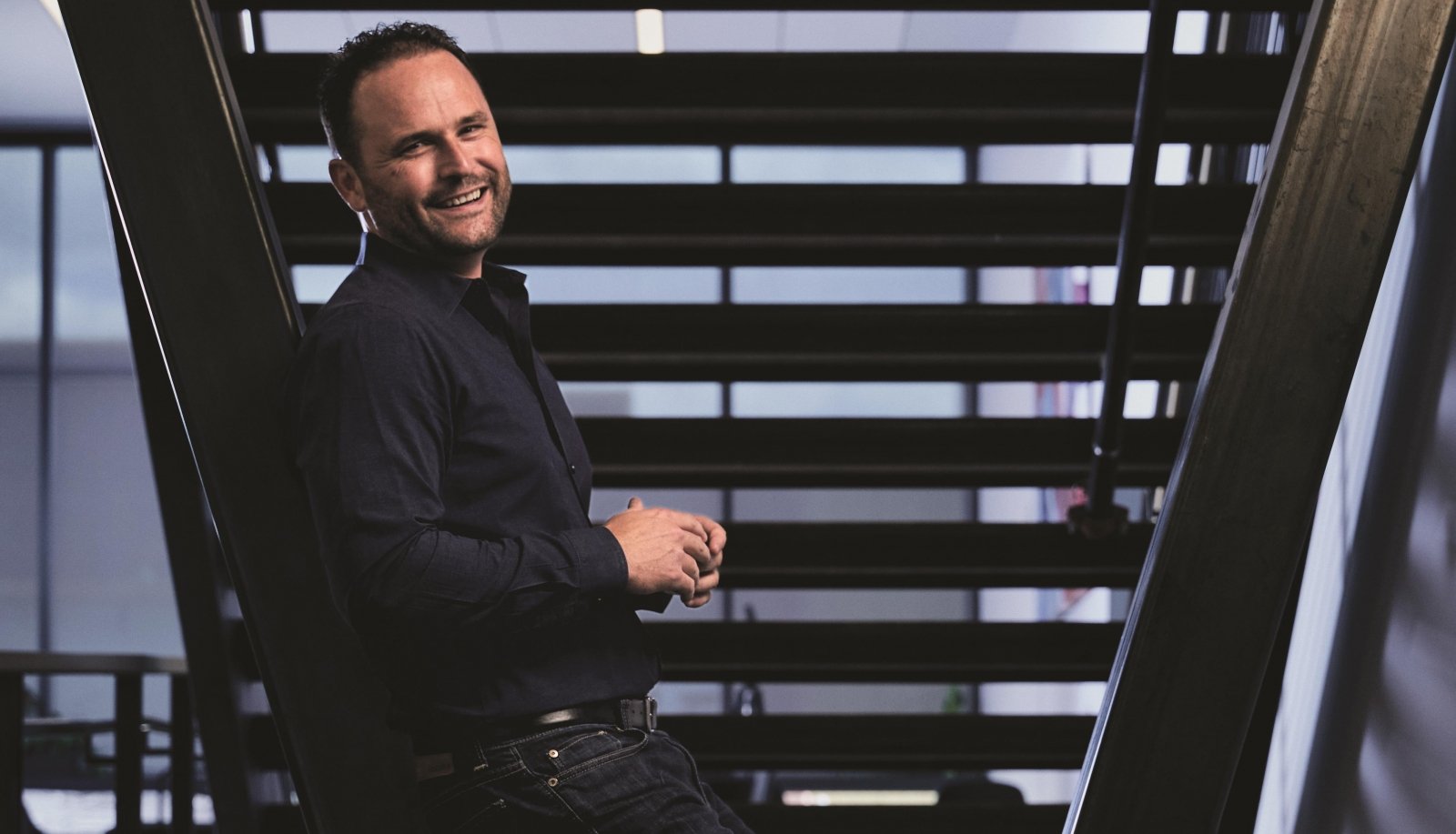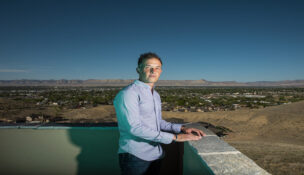Meet Our Entrepreneur of 2019: Mike Biselli
This health-care visionary aims to awaken the industry
Eric Peterson //May 1, 2019//


Meet Our Entrepreneur of 2019: Mike Biselli
This health-care visionary aims to awaken the industry
Eric Peterson //May 1, 2019//

Visitors to Catalyst Health-Tech Innovation (HTI) on Brighton Boulevard in Denver’s River North (RiNo) Art District are immediately greeted by an impressive four-story staircase. It’s a physical manifestation of Mike Biselli’s vision for this seven-story building to serve as a key cog in remaking health care for a new millennium.
A central staircase – wait for it – catalyzes collaboration between tenants, which range from startups to national and statewide health care organizations, by upping human interaction.
“When you create a physical built environment to allow wicked smart, passionate people to physically collide, those are the moments innovation occurs,” Biselli says. “We need people in the building running into each other over and over and over again, creating trust layers amongst one another, getting to know one other, understanding each other, because this stuff isn’t going to happen overnight. It’s a long road.”
The project’s first phase opened July 2018, and its 180,000 square feet were nearly all leased out at press time. The upcoming second phase will culminate in another 150,000 square feet by 2022, with one to three sky bridges connecting the two buildings.
“We have 100-plus companies that call Catalyst home,” Biselli says. “Once it’s fully built out, we’ll expect 700 to 800 people working here.”
Biselli’s career path was unexpected. “I had no idea I was going to be in health care,” he says. “I get done playing college football and studying at Stanford and graduated in the early 2000s. What was going on then? That little thing called the dot-com bust. There were no tech jobs in the Bay Area.”
A recruiter called, and Biselli subsequently worked for several medical device companies. “From there, I jumped into an entrepreneurial career by co-founding, launching and subsequently selling MedPassage,” he says.
In January 2014, Biselli was vacationing in Mexico shortly after selling the online marketplace for medical devices. “I wasn’t sure what I was going to do next,” he says. “I said, ‘I’m not going to go and just build another company.’”
He decided he wanted to “be the shockwave this industry needs to wake up, to recognize that we have to do something different. We can’t continue on the same path. We’re bankrupting the country. We’re at 20-plus percent of GDP being spent on this industry with not even a top-five outcome on the planet. I want to leave a lasting impact of firing people up, blowing up the silos, ripping down the orthodoxy that has put us in this position in the first place.”
Over the course of his career in health care, Biselli says, “I saw how fundamentally and utterly disconnected so many of the silos are in the most complex industry in our country, whether that be the established incumbents like the Kaisers and the UC Healths all the way down to that woman with an idea on a napkin, and everything in between: government officials, academia, nonprofits, associations, even the patients themselves. We don’t even get to hear the patient’s voice, but these are the people we are ultimately serving.”
The big epiphany “was this vision and this dream for Catalyst: a campus bringing these people together every single day, and that’s what we now see,” Biselli says.
After returning to Denver, Biselli partnered with Koelbel & Co. as a developer and the landowners, the Burgess family, in 2015. Ground was broken in 2016. Two years later, it opened its doors.
The end result is like attending a conference “to learn, to network, to see what’s on the cutting edge, and to find new business opportunities,” Biselli says. “Now take those same ideas — why we invest so much in going to the conference — it’s happening daily at Catalyst with so many different stakeholders and so many different angles in the industry.”
While there is coworking space on the fourth floor, Biselli says he didn’t want to build a WeWork for health care. “That’s not enough,” he says. “Startups alone are not going to move this industry forward. It’s too complex. Building a neighborhood, building a community, building trust—that’s how we start moving partnerships forward. If we can just start getting in the same boat, rowing in the same direction, imagine the revolution we can spur and ignite.”
There have been early blooms from this deep-rooted idea. “Lutheran Medical Center met and collaborated with Nymbl Science, a fall-prevention technology. That happened after they met on campus,” Biselli says. “CORHIO and Delta Dental created a huge partnership. UC Health is engaging with numerous startups on campus. Same with Kaiser.”
He says early returns have exceeded expectations, noting, “It’s amazing to watch the organic growth of collaboration in the ecosystem of the campus.”
Biselli sees another side effect: career rejuvenation. “This machine that is the health care industry chews you up and spits you out. It beats you over the head. It completely deflates you,” he says.
In his eyes, Catalyst has changed that dynamic. “I’ve had people on campus say they were going to leave the industry altogether,” Biselli says. “This has recommitted these leaders to being in the industry. You can’t even put a price tag on that.”
Originally from the Reno area, the self-described “mountain boy” landed in Colorado in 2008. “When I’m not rabble-rousing and causing trouble within the health care industry, I absolutely love to unplug by way of skiing, hiking, camping, and taking advantage of these incredible outdoor assets we have in Colorado,” he says.
Biselli’s “next big journey” is as CEO of Firepoint Studios, a new company helping health care organizations around the world innovate.
But first, he just took a month to unplug in Asia, his first big vacation since his epiphany in Mexico five years ago. “One thing I’ve learned through this journey as an entrepreneur is it is incredibly hard,” he says. “Entrepreneurs have some of the highest suicide rates in the country.”
On advice from mentors, he took a break to contemplate his next moves. “I was ready to do some inner work and do a deep dive,” Biselli says. “What am I going to get fired up in this next five years?”



























